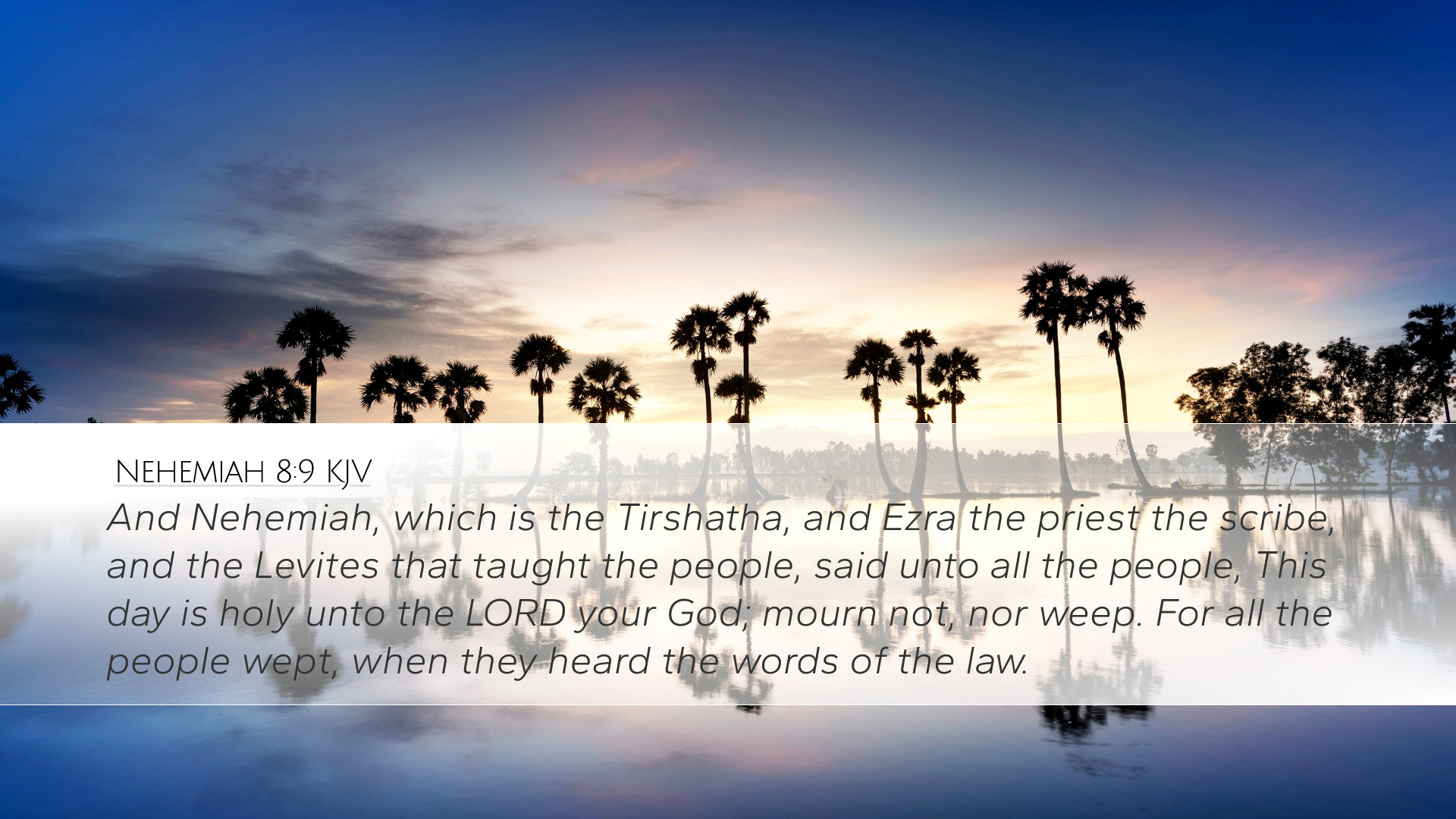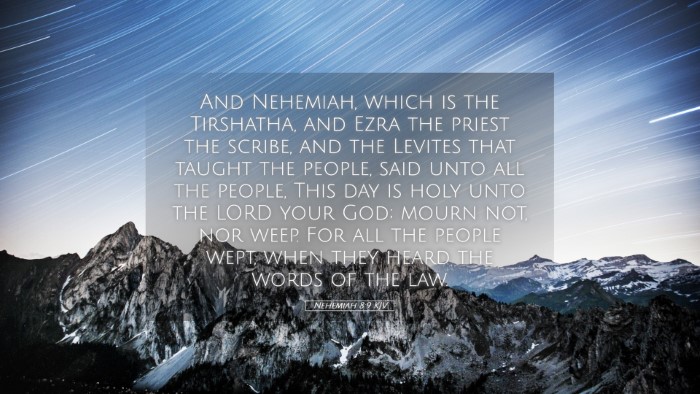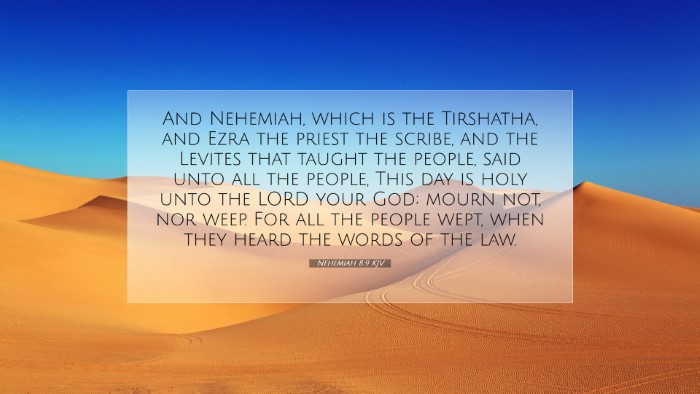Old Testament
Genesis Exodus Leviticus Numbers Deuteronomy Joshua Judges Ruth 1 Samuel 2 Samuel 1 Kings 2 Kings 1 Chronicles 2 Chronicles Ezra Nehemiah Esther Job Psalms Proverbs Ecclesiastes Song of Solomon Isaiah Jeremiah Lamentations Ezekiel Daniel Hosea Joel Amos Obadiah Jonah Micah Nahum Habakkuk Zephaniah Haggai Zechariah MalachiNehemiah 8:9
Nehemiah 8:9 KJV
And Nehemiah, which is the Tirshatha, and Ezra the priest the scribe, and the Levites that taught the people, said unto all the people, This day is holy unto the LORD your God; mourn not, nor weep. For all the people wept, when they heard the words of the law.
Nehemiah 8:9 Bible Commentary
Commentary on Nehemiah 8:9
Bible Verse: Nehemiah 8:9 - "And Nehemiah, which is the Tirshatha, and Ezra the priest the scribe, and the Levites that taught the people said unto all the people, This day is holy unto the LORD your God; mourn not, nor weep. For all the people wept, when they heard the words of the Law."
Contextual Background
Nehemiah 8:9 takes place after the return of the Israelites from Babylonian exile. The walls of Jerusalem have been rebuilt, and the people have gathered to hear God's Law read aloud. This moment signifies both a spiritual renewal and a communal restoration of identity, making it a pivotal point in the covenant community's revival.
Significance of the Law
- Understanding the Law: Ezra's reading of the Law is crucial because it anchors the people in their history and covenant relationship with God. Matthew Henry notes that “the reading of the Word is the foundation of all reformation.”
- The Impact on the People: The realization of their shortcomings and sins leads the people to sorrow. They are reminded of their past transgressions, which is why they weep. Adam Clarke emphasizes the emotional weight the Law carries: "The Law is perfect, converting the soul; it exposes sin and shows the need for repentance."
The Role of Nehemiah and Ezra
Nehemiah and Ezra serve as pivotal figures in this scripture, guiding the people through this moment of revelation.
Nehemiah as the Tirshatha
Identified as the Tirshatha, or governor, Nehemiah has a dual role of leader and spiritual guide. His response to the people's weeping is both pastoral and authoritative. He calls for a perspective shift: mourning is not the appropriate response. Instead, they should embrace the day as holy.
Ezra the Priest and Scribe
Ezra’s role as a scribe and teacher of the Law positions him as a crucial spiritual leader. He acts as a mediator between God's Word and the people's understanding. Albert Barnes reflects on Ezra’s significance, noting that he was “well-versed in the Law and deeply respected by the people for his devotion and knowledge.”
Exhortation to Joy
Nehemiah’s instruction, "This day is holy unto the LORD your God," emphasizes the importance of celebrating God's faithfulness despite past failures. This command counters the natural inclination to dwell in sorrow over sin.
The Holiness of the Day
The declaration of the day as holy highlights God's restorative intentions. The people are being called to remember the grace that accompanies their covenant relationship with God. Both Henry and Barnes assert that holiness should invoke joy rather than despair, as it stands as a testament to divine mercy and provision.
Emotional Responses to God’s Word
- Transformation through the Word: The weeping signifies contrition and recognition of their need for redemption. Adam Clarke remarks that “the Word of God, while it brings a sense of guilt, also opens the pathway for forgiveness and grace.”
- From Mourning to Celebration: Nehemiah's call to refrain from weeping redirects their emotional response to one of joy. Henry suggests that "joy in the Lord is both a strength and a command," emphasizing the necessity of celebrating the closeness of God.
Applications for Today’s Church
The events of Nehemiah 8:9 have enduring implications for modern believers and the Church. Here are several applications drawn from esteemed commentators:
1. Prioritizing God’s Word
In our churches today, the centrality of God's Word must remain paramount. Ezra’s commitment to reading and teaching the Law illuminates the need for sound doctrine and Biblical literacy among congregants; it is the catalyst for spiritual renewal.
2. Embracing Community Confession
As seen in this scripture, community acknowledgement of sin is vital. Churches should encourage collective confession and create spaces for lament, paralleling the Israelites' experience while also leading them towards the hope found in Christ.
3. Celebrating God’s Holiness
The call to recognize holy days reverberates in the acknowledgment of times for worship and celebration in the Christian calendar. This act serves to cultivate a lifestyle of gratitude and joy.
4. Navigating Emotions with Truth
Modern believers often grapple with emotions in response to biblical truths. Nehemiah’s guidance serves as a reminder that while sorrow over sin is appropriate, it must be accompanied by a focus on God's joy. True remorse transforms into joy when we turn to the redemptive narrative of Scripture.
Conclusion
The account in Nehemiah 8:9 is a rich tapestry of biblical truths that resonates across generations. For pastors, students, theologians, and Bible scholars, it challenges us to reclaim the authority of Scripture, embrace community, and maintain a balanced emotional response to God’s holy Word. May we echo Nehemiah's exhortation to rejoice in the grace and holiness of God, as we reflect on our own narratives of restoration and renewal.


